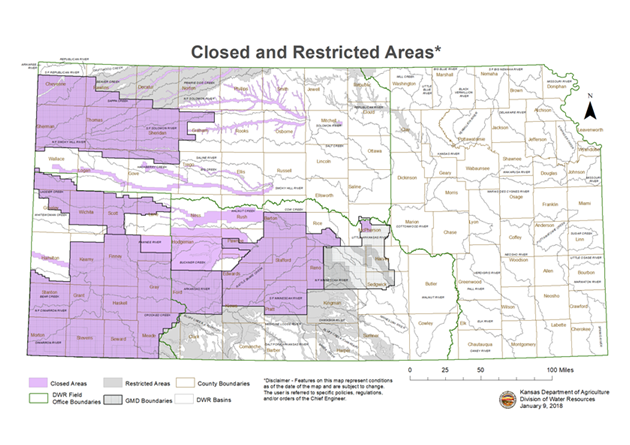The new applications unit evaluates new applications to appropriate water for beneficial use.
Developing a water right begins with filing an application to appropriate water for beneficial use. The application must be filed on the
application form prescribed by the Chief Engineer, and must include at least the following information:
- Name and mailing address
- Original signature of the applicant or an authorized representative
- The source of water supply (surface water or groundwater)
- Proposed place of use
- Proposed point of diversion
- Maximum rate of diversion and quantity of water requested
- The statutorily required (non-refundable) filing fee (See fee schedule attached to the application form)
Once accepted for filing, the application is assigned a priority date and a sequential file number. Applications are processed in the order they are received. During review, division staff will contact the applicant when additional information is needed.
Additional items which will be required to evaluate your application:
- If applying for groundwater, a test hole log or well log within 300 feet of proposed well
- Detailed topographic map -- (see page 2 of the instruction sheet)
- Names and addresses of well and/or landowners within one-half mile of the proposed point of diversion
- Justification for the amount of water requested. The amount of water requested must be reasonable for the intended use.
Specific regulations to which an application to appropriate water for beneficial use may be subject:
- Safe Yield -- K.A.R. 5-3-10
- Minimum Well Spacing -- K.A.R. 5-4-4
If an application complies with all applicable statutes and rules and regulations, and if approval would neither impair use under an existing water right, nor prejudicially and unreasonably affect the public interest, an approval of application and permit to proceed will be issued by the Chief Engineer. The permit allows the applicant to proceed with construction of the diversion works as authorized by the permit, and perfection of a water right. The applicant will generally be allowed the balance of the current year, plus one year, to construct the diversion works.
If your new application is approved, there are several forms that should be downloaded from our website, which are available in
one downloadable package.
When the diversion works have been constructed and are complete, the owner must submit a Notice of Completion of Diversion Works and pay a field inspection fee of $400. A notice of completion instruction sheet has been included on this site for reference. If additional time is needed, the owner must submit a request for an extension of time to complete the diversion works, with an extension fee of $100, prior to the deadline. When requesting an extension of time the owner must show when the diversion works are expected to be completed, the progress that has been made toward completion, and the reason for non-completion. If the total time has been more than 16 months, the owner must submit a copy of a contract with a well driller, or other information substantiating the intent to complete construction. If the total time allowed equals or exceeds 24 months, an extension of time may be granted only if the applicant demonstrates that circumstances beyond their control had prevented the completion of the diversion works.
A reasonable period of time to perfect a water right, for most beneficial uses of water, is considered to be not fewer than four (4) years after the deadline for construction of the diversion works. For municipal use, however, a reasonable perfection period is considered to be 20 years. Please visit the
Certificate Unit Page for additional information on requesting an extension of time to perfect a water right.
If an application cannot be approved, the applicant will be notified by mail. The notice also will inform the applicant of the reason for non-approval. The applicant will have 15 days to supply DWR with information supporting reconsideration or request additional time to gather more information. Some areas of the state are considered fully appropriated, based on safe yield, which now are closed to further new appropriations.
Please review the
map of Closed and Restricted Areas prior to filing an application.
